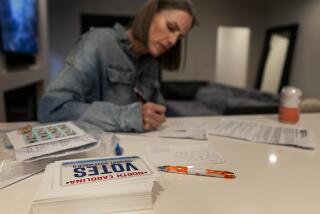Quality May Serve Us Better Than Quantity at the Polls
- Share via
More than 150 years ago, the writer James Fenimore Cooper put it this way: “The man who can right himself by a vote will seldom resort to a musket.”
Cooper found agreement on the point even with his old nemesis, Mark Twain, who set aside humor to observe: “Where every man in a state has a vote, brutal laws are impossible.”
Ah, voting. When you read through American civics, you find that almost everybody who presumed to comment on our nation had something celebratory to say about the franchise.
The U.S., no one should forget, pioneered the idea of self-governance on a grand scale by way of popular elections.
Only elections aren’t so popular anymore. In the 2002 primaries, 83% of eligible Americans exercised their rights as free citizens and chose not to vote.
Ennui in California rose to heights unseen in seven decades: 75% of eligible voters decided not to bother.
Or put it this way: Far more people stake their hopes on playing the Lotto than on participating in democracy.
We now bemoan the results: With the onset of autumn, the public begins to lay eyes on the matchups of candidates chosen by tiny fractions of their neighbors.
Yikes.
Our normal suspicions about those who seek political office turn into outright alarm.
Consequently, fewer people muster the enthusiasm to drive down the block and cast a vote in the general election.
Two truths: I’ve never met anyone who would forfeit their right to vote. Likewise, everyone knows that the U.S. would be a much different country if everyone availed themselves of the opportunity and actually cast an informed vote.
So, do we have a crisis on our hands?
Instinctively, we are conditioned to say yes. But I don’t think it’s quite as simple as that.
The hand-wringers have been telling us for decades now that something must be way wrong in the land for participation to be so low. Yet many nonvoters I know are not distraught, but content.
We live in an age of decidedly centrist politics, driven in large measure by personality. Most candidates are foursquare in favor of a full-employment economy, equal opportunity, a healthy environment, good schools and health care. Thus, political differences boil down to the tactics and philosophy of governance--and for a good number of people, it’s enough to leave that choice to others.
I keep telling myself, in the absence of a shred of supporting evidence, that if Americans were half as disillusioned as the worrywarts believe, candidates would materialize to offer sharper choices, with the result that many more of us would be voting.
There’s another matter, usually too delicate to be discussed directly. That’s the distinction between voting and voting wisely.
For as long as I’ve covered politics, I’ve listened to experts say that we need to make registration and voting simpler, easier--as if turnout is depressed by the difficulty of navigating bureaucratic hurdles. In truth, registration has never been simpler in most places, and it’s getting more so all the time. Californians will decide in November a ballot proposition to allow adults to register and vote at the same time, joining six other states in trying to appease those who put off everything to the last moment.
The real difficulty in voting, however, isn’t in the paltry investment of energy it takes to mark a ballot or to register. It’s in the preparation. To cast an intelligent ballot requires more than casual exposure to TV commercials.
In recent decades, many Americans have lost faith in those who offer considered election guidance, whether political parties, newspaper editorials or interest groups. Thus the rise of the vaunted “independent voter.”
Sounds lofty. But in truth, the homework necessary to inform oneself about the issues and candidates in most elections is no less than that faced in an upper-division college class.
From what I can tell, many Americans aren’t up to the task. Reading through opinion surveys is always as amusing as it is sobering. Almost half the nation believes that the communist creed “from each according to his abilities, to each according to his needs” is spelled out in U.S. Constitution. And though 66% of adults can identify Regis Philbin as host of a TV game show, only 6% can name Dennis Hastert (R-Ill.) as speaker of the U.S. House of Representatives.
So, would our democracy be better served if more people voted?
As I said, it’s not as simple as answering yes.
More to Read
Get the L.A. Times Politics newsletter
Deeply reported insights into legislation, politics and policy from Sacramento, Washington and beyond. In your inbox twice per week.
You may occasionally receive promotional content from the Los Angeles Times.










